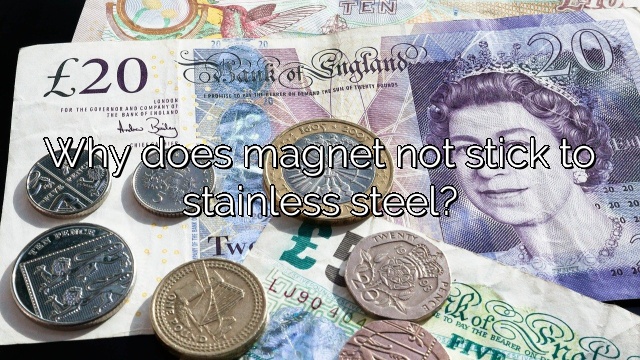Some steels are only weakly magnetic, and some are not magnetic at all. Austenitic stainless steels like 304 or 316 stainless are good examples of this. A ferritic stainless like 430 stainless steel, on the other hand, is ferromagnetic. Magnets stick to it.
Biden Fires Warning Shot for Retirees ... Are You at Risk?
Will a magnet stick to 100% stainless steel
Some opera steels are magnetic, some customers are not. The determining factor associated with magnetism depends on the microstructure of the particular steel. Martensitic stainless steels (having a ferritic microstructure) are magnetic. Austenitic steels contain nickel and remain non-magnetic.
Which types of stainless steel are magnetic
Stainless steels 410, 420 and 440 are martensitic stainless metals. This stainless steel is magnetic mainly because its inorganic composition contains a fairly large amount of ferrite, which is a combination of iron and other elements.
Why won’t my magnets stick to stainless steel
Like all ferromagnetic alloys, whenever ferritic stainless steels are heated to a high enough temperature – their Curie temperature – they burn out in their ferromagnetism and become paramagnets – meaning that they do not retain their own magnetic field, but remain pulled outward. .
How can you tell if something is stainless steel
If you momentarily grind an object on a grinding wheel and it causes sparks to “glow”, then it is steel. If it is very non-magnetic and sparks, the target is probably mostly made of special 300 series stainless steel.
Which stainless steel is least magnetic
Potentially, this can happen when three conditions are nearly always met: The part is loaded (either by applied fill or by residual stress).
The ecosystem is aggressive (high chloride levels, temperatures above 50°C (122°F), S range 2 hours).
Stainless steel is not sufficiently resistant to SCC.
Why do magnets stick to stainless steel guns
Magnet won’t hold stainless steel revolver? Member of Walt White. I have a stainless steel Pietta revolver.
Member of Sam Cade. Well, the 300th series is not magnetized at all, but it definitely won’t fit into the frame.
Retired member of the USNChief.
Member of Walt White.
rhinoceros member.
member of the Lemaimiami.
member of MadFive.
Member of Brika.
cfullgraf member.
Member of Brika.
More articles
Do THIS Or Pledge Your Retirement To The Democrats
Does steel attract to a magnet
Become. Steel also has ferromagnetic properties and is a derivative of iron. Most steels are attracted to magnets. If necessary, steel can also be used to create a permanent magnetic field. Are diamonds magnetic?
Did the iron sulfide stick to magnet did the sulfur powder stick to the magnet
You have taken two elements and combined these animals into a mixture. You will definitely separate the components of the mixture by stirring the powder with a magnet; Iron filings will stick to the magnet, but sulfur filings will not. … The elements definitely react and form iron sulfide, which is a compound.
Why does a magnet stick to my stainless steel refrigerator
Why do magnets stick to some stainless steel appliances? When the stainless steel cookware coating is relatively thin and the main core is ferromagnetic, a strong magnet adheres to the surface, causing the magnetic force to actually penetrate through the stainless steel to the core material.
Does magnet stick to stainless steel refrigerator
Not exactly, stainless steel often shows only fingerprints, and it may not form your magnets either. If the nickel content of the stainless steel is significantly higher, the wine cellar façade will not be magnetic. Some magnetic baskets use strong double-sided tape to hold them in place.
Why does magnet not stick to stainless steel
Like all ferromagnetic alloys, when heated to high temperatures – their Curie temperatures – ferritic stainless steels lose their ferromagnetism and become paramagnetic, that is, they do not retain their magnetic field, but remain attracted from the outside.
ALERT: Secret IRS Loophole May Change Your Life


